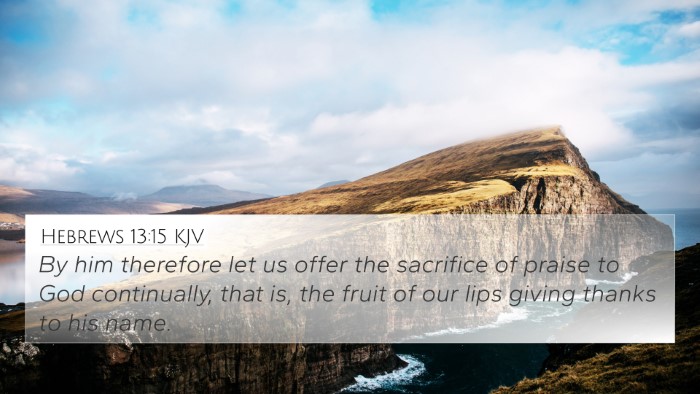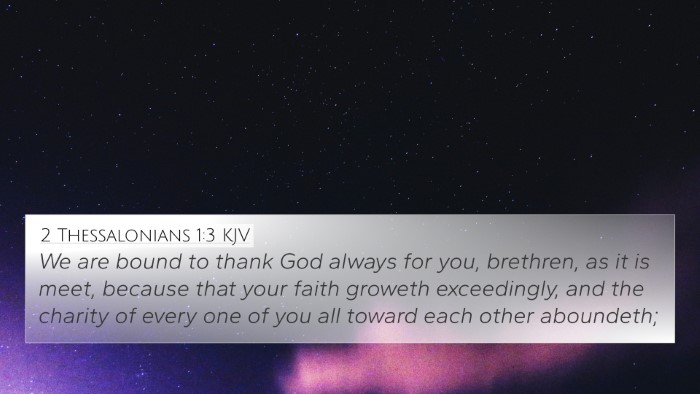Ephesians 5:20 - Summary and Interpretation
Bible Verse: Ephesians 5:20 - "Giving thanks always for all things unto God and the Father in the name of our Lord Jesus Christ."
Meaning and Interpretation
The Apostle Paul, in his letter to the Ephesians, emphasizes the importance of gratitude as a Christian virtue. In Ephesians 5:20, he instructs believers to give thanks always and for all things.
This verse encapsulates a profound theological truth: gratitude is not merely a response to favorable circumstances; rather, it is an attitude of the heart rooted in faith. Paul places thanksgiving in the context of worship, suggesting that our expressions of gratitude should be directed towards God the Father through Jesus Christ.
Insights from Public Domain Commentaries
-
Matthew Henry: Henry notes that giving thanks is necessary both in personal spirituality and social relationships. It cultivates a righteous heart and expresses recognition of God’s sovereignty and goodness in all situations.
-
Albert Barnes: Barnes highlights that this command to give thanks encompasses "all things," indicating no aspect of life should be excluded, even trials, as they serve a purpose in God’s overarching plan.
-
Adam Clarke: Clarke emphasizes the aspect of continual thanksgiving in prayer and worship, underlining that such an attitude will lead to a deeper relationship with God and a recognition of His presence in everyday life.
Connections to Other Bible Verses
Ephesians 5:20 can be cross-referenced with several other scriptures that relate to the theme of gratitude and thanksgiving. These connections enhance our understanding of biblical teachings regarding thankfulness.
- 1 Thessalonians 5:18: "In everything give thanks; for this is the will of God in Christ Jesus concerning you."
- Colossians 3:17: "And whatsoever ye do in word or deed, do all in the name of the Lord Jesus, giving thanks to God and the Father by him."
- Philippians 4:6: "Be careful for nothing; but in every thing by prayer and supplication with thanksgiving let your requests be made known unto God."
- Psalm 107:1: "O give thanks unto the Lord; for he is good: for his mercy endureth forever."
- Psalm 136:1: "O give thanks unto the Lord; for he is good: for his mercy endureth forever."
- Matthew 26:27: "And he took the cup, and gave thanks, and gave it to them, saying, Drink ye all of it."
- Hebrews 13:15: "By him therefore let us offer the sacrifice of praise to God continually, that is, the fruit of our lips giving thanks to his name."
Theological Reflections
In Ephesians 5:20, Paul places thanksgiving within the broader context of Christian conduct. The connectedness of believers in worship is established through mutual gratitude towards God and each other, which underscores the relational aspect of faith. This act of thanksgiving leads to spiritual joy and deeper fellowship with the Holy Spirit, stirring communal unity.
Practical Applications
Practically, embracing a lifestyle of thanksgiving can transform the believer's experience:
- Develop a Prayer Habit: Incorporate thanking God into daily prayers, recognizing His providence in all circumstances.
- Reflective Journaling: Keep a journal to note moments of gratitude and reflect on God’s workings in various situations.
- Encourage Others: Share personal testimonies of gratitude within community settings, promoting a thanksgiving culture.
Tools for Bible Cross-Referencing
To effectively explore the connections of themes found in Ephesians 5:20, consider utilizing the following tools:
- Bible Concordance: A comprehensive guide can help identify relationships between verses.
- Bible Cross-Reference Guide: These guides often provide relevant verses that correlate with specific texts.
- Cross-Reference Bible Study: Study methods that focus on linking scriptures can enrich understanding.
- Bible Reference Resources: Tools that offer thematic studies can assist in grasping complex interconnections.
Conclusion
Ephesians 5:20 serves as a compelling reminder of the significance of gratitude in the life of a believer. It not only fosters personal relationship with God but also strengthens communal bonds. Engaging with the broader biblical narrative through cross-referencing enhances our understanding of the Scriptures, allowing us to see interconnected themes and divine truths woven throughout the text.






















